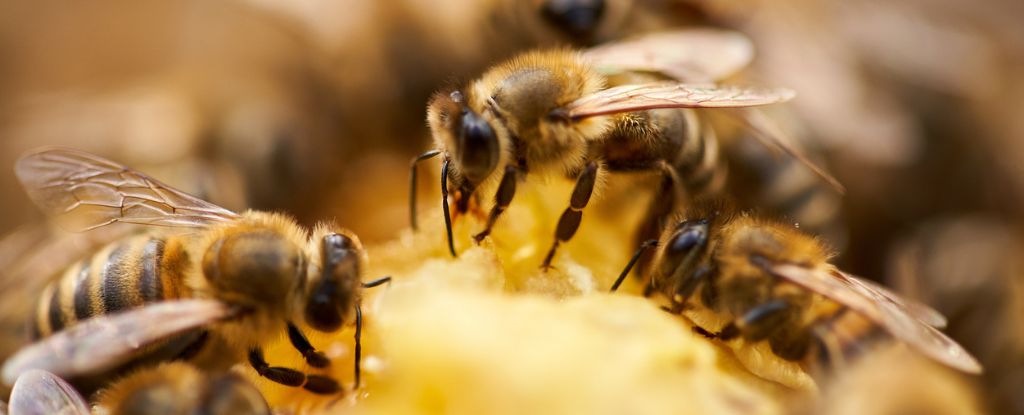Products You May Like
Commercial beekeepers in the United States will soon have access to a vaccine that could save their hives from the most devastating disease honeybees face today.
The medicine was designed by the biotech company Dalan Animal Health to ward off American foulbrood (AFB), a contagious condition caused by a spore-forming bacterium Paenibacillus larvae.
Incorporated into the feed of a hive’s worker bees, the oral vaccine is transferred into the ‘royal jelly’, which is fed to the queen.
The pathogen has only one known host: honeybee larvae. Once it infects a hive, it is notoriously difficult to eradicate. The only effective way to get rid of the bacteria for good is to send everything up in flames: the hive, the tools, and the bees themselves.
Any spores that don’t burn can remain viable for 70 years or more, ready to infect the next colony that comes their way. Tragically, the bacteria can overcome an entire hive in as little as three weeks, leaving bee keepers little time to respond.
In 2022, Dalan sponsored a placebo-controlled trial on the safety and efficacy of the vaccine with great results. Not only did the medicine protect workers and the queen from dying of AFB disease in testing, it also bestowed immunity to the next generation by working in the royal’s ovaries.
The US Department of Agriculture will grant a two-year conditional license for Dalan’s honeybee vaccine, but there’s a good chance the treatment will be extended for public use beyond that timeline.
For the next two years, Dalan will distribute a limited amount of the vaccine to beekeepers in the US. After that, if all goes well, there’s a chance beekeepers will be provided with direct access the vaccine.
“This is an exciting step forward for beekeepers, as we rely on antibiotic treatment that has limited effectiveness and requires lots of time and energy to apply to our hives,” said Trevor Tauzer, a beekeeper and board member of the California State Beekeepers Association, in a statement.
“If we can prevent an infection in our hives, we can avoid costly treatments and focus our energy on other important elements of keeping our bees healthy.”
The global decline of honeybee populations is a serious issue in our modern world. In the US alone, intensive farming techniques, harmful pesticides, and climate change, among other factors, have led to a 90 percent decline in bee populations since 1962, leading to what’s looking to be a ‘global pollinator crisis‘.
That incredible loss not only puts natural ecosystems in a vulnerable position, it also risks a third of the global food supply and the basic nutrition of our own species.
A recent study from Harvard University, published in December of last year, found inadequate pollination is reducing the global yield of fruits, vegetables, and nuts by 3 to 5 percent.
As a result, many people will struggle to access healthy food options, leading to an estimated 427,000 excess deaths from ill health.
Interestingly, in the models used by Harvard researchers, low-income nations would lose significant income as crop yields decline, potentially up to 30 percent of their total agricultural value.
But it was people in middle- and higher-income nations who showed the most health effects, probably due to the nature of today’s global food system where wealthier nations tend to import nutrition.
“This study shows that doing too little to help pollinators does not just harm nature, but human health as well,” says environmental health scientist Matthew Smith from Harvard.
A vaccine that protects them could also protect us.
The pollination crisis study was published in Environmental Health Perspectives.
